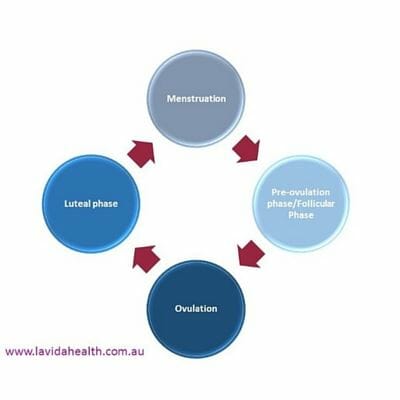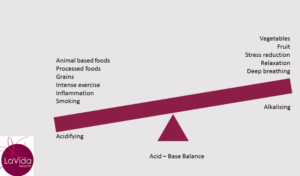Have you ever thought you just don’t ‘feel right’ or explained away your current feelings as ‘being hormonal’? Have you ever stopped to think what ‘being hormonal’ means? Hormones are vital to the functioning of all of your bodily systems. Hormones assist in regulating your metabolism, your response to stressful situations, your mental and emotional health and of course your ability to reproduce.
The female reproductive system is reliant on the functioning of a number of hormones. These hormones are not limited to the reproductive hormones, however, there are 4 key hormones that regulate your menstrual cycle – the first place to start looking when considering falling pregnant.
What hormones drive your menstrual cycle?

Follicle Stimulating Hormone
Following menstruation and prior to ovulation (which will often occur in the middle of your cycle) the pituitary gland secretes follicle stimulating hormone (FSH). This hormone stimulates a number of follicles (which each contain an egg) to begin maturing in readiness for ovulation.
One egg follicle will eventually become the ‘preferred candidate’ and will continue to develop prior to ovulation. At this time, another hormone begins to make an appearance, oestrogen.
Oestrogen
I’m sure you have heard of oestrogen, and you will have experienced the effects of oestrogen as it rises and falls during the course of your menstrual cycle.
Oestrogen levels being to rise once an egg has been selected to mature for ovulation under the guidance of FSH, and starts to prepare your body for its peak fertile time. Oestrogen will signal to the cervix to start secreting fluid which among other things assists sperm through the cervix and onward to a waiting egg, as well as giving sperm some nutrients so they have the stamina to keep on waiting (in case they have arrived a little early to the party!).
The increase in oestrogen also allows for the endometrium (uterine lining) to thicken in preparation for ovulation and implantation of a fertilised egg, and once oestrogen has reached its peak (usually around the mid cycle point), another hormone is secreted called luteinising hormone (LH).
Luteinising Hormone
Luteinising hormone is essential to ovulation and for your fertility. Once this hormone surges it signals to the ovary to release the matured egg, and the egg starts on its journey down the Fallopian tubes.
The resulting ovulation then has a cascade effect once again for another hormone to take over, and that is progesterone.
Progesterone
Progesterone (the “pro-gestation” hormone) is needed for the survival of the egg, for the successful implantation of the fertilised egg and to reduce the risk of miscarriage. Progesterone does this by ensuring the endometrium is thick, creating the right environment for the fertilised egg and stops the endometrium from shedding when a fertilised egg has implanted.
If an egg is not fertilised, it will not implant into the endometrium which will then result in progesterone levels dropping and menstruation occurring.
If an egg is fertilised and it does implant successfully, then progesterone levels continue to support the development of the fertilised egg.
How to tell if your hormones need some attention?
If you are feeling ‘hormonal’ what signs do you recognise? Below are just some of the signs that your hormones may need some attention:
You experience physical pre-menstrual symptoms such as:
- sore breasts
- changes in bowel habits, either diarrhoea or constipation, or a combination of both
- abdominal cramping
- acne
- varying cycle lengths
- no menstruation or changes in menstruation patterns
You experience emotional pre-menstrual symptoms such as:
- feelings of anger and irritability
- low mood
- tearfulness
- an increase in stress levels
What can affect your hormone function?
- a poor diet, high in processed foods, salt and sugar, places additional stress on your liver to detoxify waste effectively. This can result in the liver being unable to clear excess hormones produced with each monthly cycle.
- exercise also supports the removal of wastes from the body, including those by-products of metabolism such as hormones. Therefore a lack of exercise can result in sluggish digestion, lowered liver function, and therefore a build up of hormones in the body, which can interfere with how well your reproductive system operates.
- a high stress lifestyle means your body is releasing stress hormones such as cortisol. These hormones can interfere with those needed for fertility by telling the brain that now is not the right time to have a baby.





